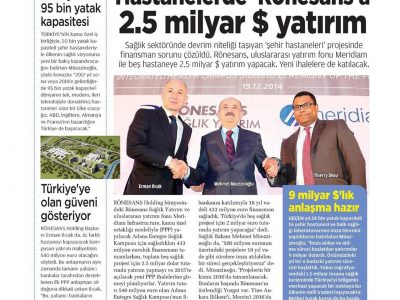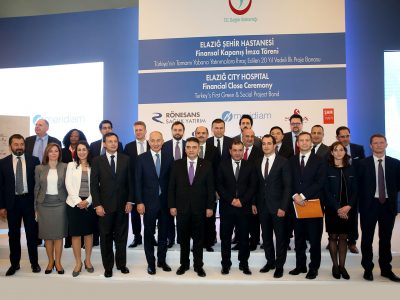“Rönesans”’s stamp on the health evolution
So far the biggest PPP-Public Private Partnership projects of Turkey’s health sector, which will accomodate many modern hospitals, were presented at the PPP Healthcare Summit 2016, held between 26-28 April at İstanbul Raffles Hotel.
Among the attendees of the summit, which was held under the patronage of the Ministry of Health, Republic Turkey, were the Undersecretary of the Ministry of Health Prof. Dr. Eyüp Gümüş, Deputy Undersecretary of the Ministry of Health Dr. Şuayip Birinci, top-level management of the strategic partner Rönesans Health Investment, as well as senior representatives from other sponsoring companies and private sector. During the summit, the advantages, success stories and future of the Public Private Partnership (PPP) model, in which the public sector investments are carried out by the private sector and leased for 25 years to the state, were discussed
“WE ARE THE BIGGEST PLAYER IN THE SECTOR”
The strategic partner of the summit and Rönesans Holding subsidary, Rönesans Health Investment (RHI), took place in the event as one of the key actors of the process.
At the summit, the most advanced global practices were introduced and the transformation in the health sector which will be realized by the PPP hospitals was discussed. Rönesans Health Investment’s CEO, Kaan Ekermen gave a speech on the leading role Rönesans Holding has undertaken for the realization of PPP projects in the health sector. Ekermen was also a spokesperson at the panel discussion on “The construction of an appropriate PPP Model” which was held during the summit.
Ekerman also stated that in return for the contracts signed, RHI will invest about 4.7 billion euros in hospital projects until 2020 and added, “We will build a total of 3.2 million square meters within the projects. Currently, we are the biggest player in the sector with our six projects and a total capacity of 9,500 bed units. We intend to maintain our leadership in the sector by evaluating new projects to be tendered.”
FIRST PROJECT TO BE COMPLETED IN OCTOBER 2016
Having stated that the construction of the hospital projects to be delivered as a PPP by RHI will gain speed this year, Ekerman said, “We aim to complete and deliver our first hospital project in Yozgat this year. We plan to start with the construction of further hospital projects in Bursa, Elazığ and Istanbul-Ikitelli in 2016. These hospitals are preparing to take their place among the largest hospitals in the world with seismic isolators.
Having mentioned about the five hospital complex projects in 5 different provinces – Adana, Yozgat, Ankara, Bursa and Istanbul-Ikitelli – in RHI’s portfolio, Ekermen, also stated that the company also run six further projects for the contruction of physical therapy and rehabilitation, psychiatry. and high-security forensic psychiatry hospitals in Samsun, İstanbul, Afyon, Diyarbakır, Malatya, Erzurum and Van. He summarized the developments of the process as follows: “We have successfully realized the financial closing of the hospital projects in Adana Yozgat. Construction of these projects is continuing in full swing. We will hand over the Yozgat hospital to the Ministry of Health in October this year. Although the planned construction period for the Adana hospital project was 36 months, we anticipate to complete and deliver it to the Ministry of Health earlier. A financing deal for the Elazığ hospital is also planned to be made this year, following similar deals for the projects in Bursa and ikitelli.”
TIME FOR TRANSFORMATION IN HEALTH SECTOR
Public Private Partnership (PPP) model, in which the public sector investments are carried out by the private sector and leased for 25 years to the state, private sector can also deliver some of the services that the public authority desires over the lease term. Medical services can be offered by the state with private sector support, all the doctors and nursing staff are provided by the state. While lease examples of this cooperation model in the world are ranging from 15 years to 30 years, for the projects in Turkey a period of 25 years has been determined.











